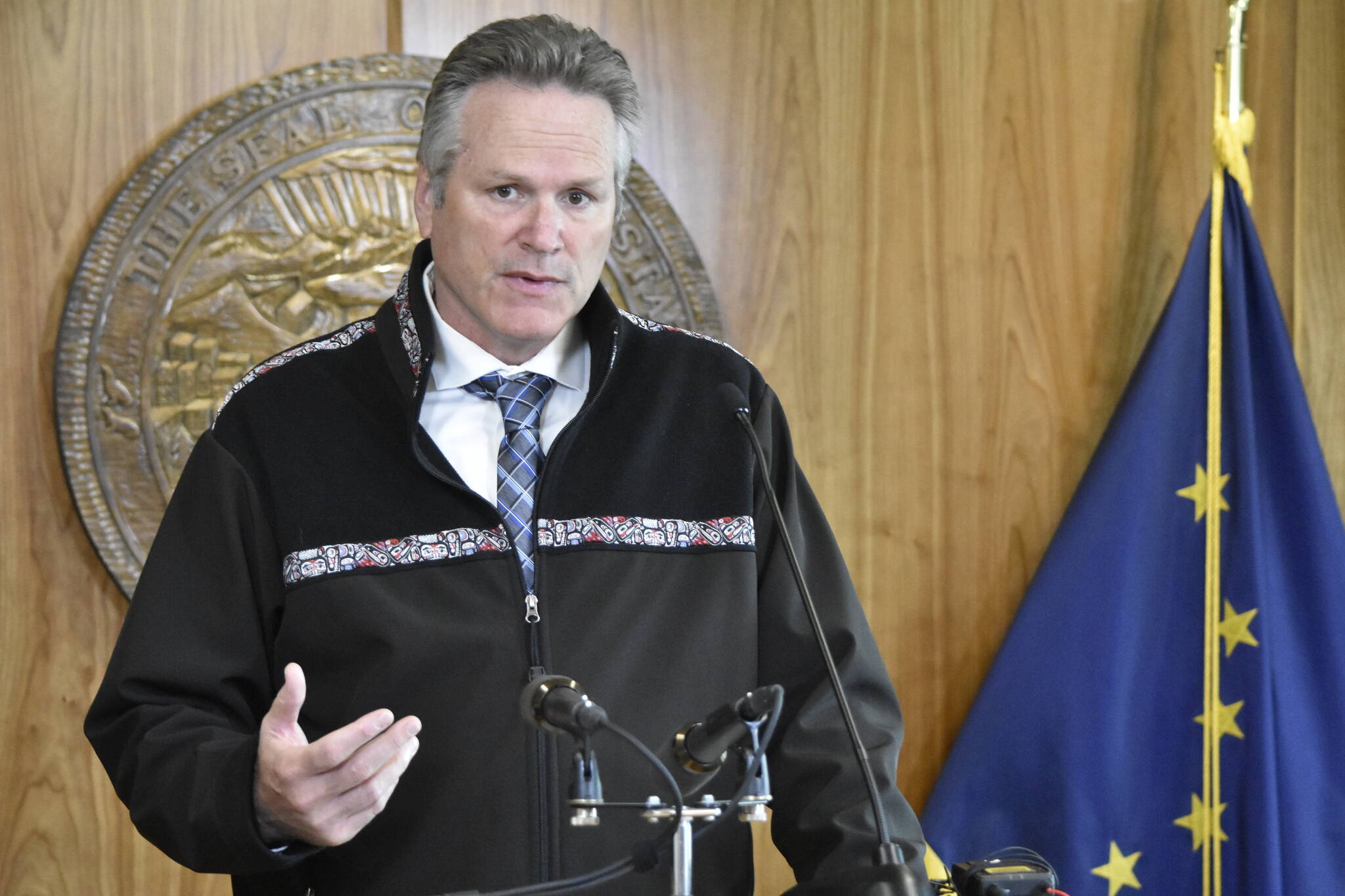The state will be adding nearly 500 short-term healthcare workers to reinforce the strained industry as the pandemic reaches new heights, said Gov. Mike Dunleavy during a news conference on Wednesday.
The move, announced by Dunleavy and administration officials, comes as health care systems across the state are showing signs of the strain, more than a year and a half into the pandemic and amid surging numbers of cases and hospitalizations.
“This has not been easy. This has not been fun in any way. I think we all wish the pandemic was over,” said an exceptionally somber Dr. Anne Zink, the state’s chief medical officer. “We are also at the worst place in the pandemic that we’ve been this entire time.”
The update comes as Alaska set a new record for new cases in a single day, with 1,251 cases between residents and nonresidents announced on Wednesday. At the same time, fatigue from the extended duration of the pandemic is degrading Alaska’s healthcare capacity as the individuals who work in the system experience burnout, Dunleavy said.
“As society goes about its business, there’s an emergency going on in our hospitals,” Dunleavy said. “A lot of people are getting burned out.”
Relief for the besieged
The state government is contracting with DLH Solutions for $87 million to bring nearly 500 healthcare workers from registered nurses to more specialized roles such as radiology technicians to Alaska on a 90-day contract, with those reinforcements rolling out beginning Sept. 27, said director of the Division of Public Health Heidi Hedberg. The contract is renewable for three 30-day periods, Hedberg said, and the funds are reimbursable by FEMA.
Previously, Dunleavy had introduced legislation to expedite the hiring of health care workers from outside the state during the Legislature’s recently concluded special session. The bill failed to pass following the addition of an anti-vaccine mandate amendment. Dunleavy said the raft of health care support is a different avenue taken in light of that outcome.
“FEMA worked with the General Services Administration and regionally they identified contractors to assist with medical support,” Hedberg said. “We are working very closely with the hospital association and their members to prioritize where they go.”
The state is taking a number of other measures to reinforce the health care system, including expanding recruitment for certified nursing assistants, streamlining training requirements for the certification of nurse aides from 140 hours to the 75 hour requirement standard under federal requirements, according to the governor’s office. The state is also working to expand the role of mobile integrated health care, a function of EMS agencies and supplying more at-home test kits for schoolchildren.
“Hospitals and EMS agencies can work together and EMS can be used to go check on those patients at home,” Hedberg said. “There’s a lot of options for mobile integrated healthcare. Each community is going to look totally different.”
The Alaska State Hospital and Nursing Home Association released a statement thanking the state for finding additional support for the system as it nears capacity.
“Our caregivers have endured unspeakable stress as they work to keep us safe, and our health care system has been tested in ways we never imagined possible,” ASHNHA said in the statement. “The prospect of relief staff coming to Alaska, a call to action for mobilizing and expanding our certified nurse aide workforce, and the recognition that care standards are rapidly escalating to crisis, are welcome developments that will help us get through the delta surge.”
Several lawmakers also released statements lauding the work of the Department of Health and Social Services.
“If the new FEMA-funded contract results in rapid recruitment of the hundreds of healthcare professionals Alaska needs, it will be an incredibly important advancement in fighting the surge. We are grateful for the work at DHSS that is moving this forward,” said Rep. Liz Snyder, D-Anchorage, in a statement. “As we wait for outside help to arrive, we must help ourselves here at home through prevention — vaccination, masking, and limiting gathering sizes. With strong leadership, these prevention measures will help keep our businesses and schools open, relieve demands on our healthcare system, and save lives.”
Careful as you go
Officials urged Alaskans to be careful, not just of COVID-19, but of other risks that could lead them to require some of the increasingly scarce hospital space.
“My experience is that the [healthcare] capacity is very tight,” Dunleavy said. “The last thing I want to do is become melodramatic or exaggerate. But I do see the capacity is strained. It’s not made up.”
Dunleavy strongly encouraged unvaccinated Alaskans to consider getting vaccinated, but he maintained his long-held position that a vaccine mandate would not be productive.
Zink urged Alaskans to do all they could to protect themselves and their community and reduce the strain on the healthcare system, whose workers had been “critically threatened and violently attacked at times.”
“You have got to be very careful the next month,” Dunleavy said. “The delta variant is causing a lot of infection. It’s causing people to die. These are facts.”
The actions of individual Alaskans will ultimately determine the fate of the state, Zink said.
“We collectively control how quickly this will happen and how many Alaskans we’ll lose along the way,” ZInk said. “No pandemic lasts forever, and it takes all of us to change that course.”
Zink pulled from a classic in her impassioned plea to Alaskans to make good choices to protect themselves, their families, and their communities, paraphrasing a famous line of J.R.R. Tolkien’s “The Fellowship of the Ring. ”
“All we have to decide is what we do with the time that is given us,” Zink quoted.
• Contact reporter Michael S. Lockett at (757) 621-1197 or mlockett@juneauempire.com.


